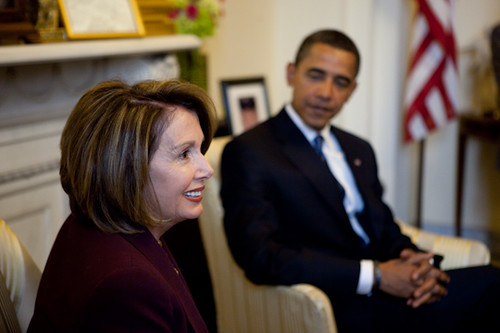 The President’s current political, foreign policy and domestic issues remind me of running a business in challenging times.
The President’s current political, foreign policy and domestic issues remind me of running a business in challenging times.
Never forget about customer experience and how markets change.
Our economy totally tanked. Yet the Obama administration and Congress marched forward into health care as if nothing was really different. A more moderate approach to health care reform, coupled with a stronger emphasis on innovation initiatives to improve our long term economy would have been a smarter move on the administration’s and Democratic party’s part.
To what extent is your business model based on old paradigms about your target market?
Recognize competitive threats, but don’t get so focused on the threat, you lose sight of opportunities.
The terrorist threat is daunting and must be managed, much like many competitive threats businesses face. But if all US policy’s focus is on this threat, as NYT columnist Thomas Friedman wisely writes, we’ll slowly fall into ruin. Managing terrorists does nothing to advance our economic vitality. Indeed, homeland security diverted a significant percent of the basic scientific research we rely on government to fund to keep our economy vital.
What competitive threats are forcing you into a defensive position with little positive to look forward to?
Make sure any new business model is aligned well with external trends.
The majority of Americans have concluded that Democrat’s proposed health care policy was too much change and cost in light of our current economic issues. Had the bill dealt with medical-legal costs, offered much smaller entitlements, and created more individual incentives to be healthy, business and consumer public opinion would be quite different.
Is your business model aligned with where your markets are headed?
Reduce investing in legacy businesses that are likely to go by the wayside and, instead, deploy disproportionate resources into efforts that build a better business model.
The public anger over the stimulus arose because we put the nation further into debt with little to show for it. As an economist I understand some of the stimulus spending (e.g., expanded unemployment benefits and keeping police and fire officials on the job). But we lost a huge opportunity to create investments that would make our businesses far more productive. Instead, too much political pork got funded. If you must go into debt, invest in things with high future return.
Are you spending scare investment funds on things that offer little incremental return vis a vis your future? The group that created Lunchables at Oscar Mayer-Kraft fought like marines to steal resources from the bologna business. Fortunately their tenaciousness paid off and Lunchables became one of the best new products in grocery store history.
Find the investments that reduce competitive threats while creating growth opportunities at the same time.
One of the most urgent needs in our country is to stop importing oil and become energy independent. We’d reduce political threats against us, enhance our economic success and generate jobs at the same time. While cap and trade may not be the right approach in a slow economy, it’s time we recognize how we have subsidized oil and coal with our federal policies and start to level the energy playing field. The public benefit of energy independence is so great that individual companies will never invest enough. If ever there was a case for government subsidies, alternative energy is it.
The same could be said about agricultural policies and health care. Until we stop subsidizing corn and sugar and encourage farmers to invest in production of healthier foods, we will have an obesity problem and escalating health care costs.
What are the home run investments in your business? How can you obsolete competitive threats while at the same time seize attractive opportunities?
____________________
For insight on business model innovation, read my recently released book, Beyond Price.


Hi Kay, It appears the Democrats are taking your advice with regard to health care, at least for the time being. It strikes me reading your post how much our federal government is a prisoner of its own inner dynamics, its bureaucracy, its internal structures. And all this from institutions that by definition are supposed to look outward, are obliged to represent us. Imagine how much more difficult it is for private sector organizations to maintain an outward, innovative focus.
.-= Brad Shorr´s last blog ..A Dialog on Blogging Focus, Part 3 =-.
I beauty of the profit motive is that is generally works to align business’ interests with customers’ interests. The reelection drive used to do this when our districts were filled with voters with a true mix of political perspectives. But the political process jury-rigged districts, so now politicians are rewarded for being more extreme and rigid. One of the things I love about our country is the growing group of independents–people turned off by both political parties. They are slowing becoming the moderating influence in politics. Lose them and you lose the election on a national or state-wide basis.
On my way down to Indianapolis I pass a huge wind farm and wish that a lot more of the stimulus had been pushed in that direction. Investments like the increased funding for NIH or energy initiatives just seem to have longer term potential than what most of the budget was spent on.
In the meantime, my concern right now is that we haven’t stabilized enough for the private sector to pick up where the stimulus will be leaving off. Our local school district is looking at a 10% cut in personnel given existing tax revenues. That type of government reduction over the next year could have a spiraling effect.
.-= Fred H Schlegel´s last blog ..Open Innovation – Filing a non-patent =-.